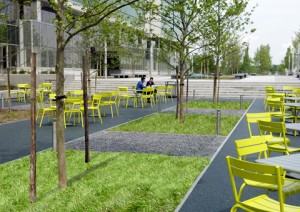Green Building Credits/Points
Depending on overall project utilization, Filterpave pavements offer contributions to LEED® green building credits and NAHB Green Points
Recycled Material
The FilterPave Glass Series makes productive use of plentiful 100% post-consumer recycled glass and removes garbage from landfills.
Low Carbon Footprint
Unlike most existing hard-surfaced porous pavement, the FilterPave system reduces contribution to the creation of hydrocarbons. Asphalt, concrete and manufactured pavers utilize petroleum based and manufactured materials that require a significant amount of energy to mine or produce (bitumen, cement, aggregate).
Low Impact Development
The highly permeable surface is a natural low-impact-development BMP for reducing stormwater runoff, managing stormwater on-site and reducing the requirements and costs for stormwater collection systems.
LEED Credit: Sustainable Sites
Credit 5.1 – Site Development: Protect or Restore Habitat (1 point)
Credit 6.1 – Stormwater Desing: Quantity Control (1 point)
Credit 6.2: – Stormwater Design: Quality Control (1 point)
Credit 7.1 – Heat Island Effect: Non-Roof (1 point)

BASF LEED Platinum HQ
BASF North American Headquarters is LEED Platnium
NAHB Green Points: Section I, Lot Design, Preparation and Development 1.3.5 Storm Water Management Plan (8 points possible)
- Mimimizes concentrated flows and seek to mimic natural hydrology
- Minimizes impervious surfaces and use permeable materials for driveways, parking areas, walkways and patios.
- Solar Reflectance Index (SRI) of Pigmented FilterPave: SRI is a measure of a surface’s ability to reject solar heat. The SRI values of the five colors range from 49 to 62, well within the limits to be classified as a cool pavement.
Recent testing at the Stormwater Management Academy at the University of Central Florida (UCF) yielded the following results:
Infiltration Rate: Filterpave will provide infiltration of storm water even under excessive sediment loading. The infiltration rate significantly exceeds the Florida draft storm water standard of 2.0 inches/hour after intentional plugging, and in many instances approaches 20 inches per hour – far more than is required to percolate most rainfall events. In fact, the limiting factor in design is the capacity of the open graded base course below FilterPave rather than the permeability of the FilterPave itself.
Water Quality Improvement: FilterPave allows the stormwater to infiltrate on site. Based on a 25 year design storm (8.4 inches/hr) in Florida, a 33% reduction in phosphorus and nitrogen was achieved.
Sustainable Void Space: The porosity of FilterPave was determined to be 39%, which is the measure of the permeability within the paving layer. Filterpave pavements are nearly twice as porous as pervious concrete and maintains the highest sustainable void space of any hard-surfaced porous pavement system.
Pavement Strength: University of Central Florida testing yielded an average compressive strength of 1160 psi and flexural strength of 508 psi. FilterPave exhibits the best characteristics of both flexible and rigid pavements. As such, the material has stronger compressive strength than porous asphalt and better flexibility than pervious concrete. These characteristics make FilterPave pavements appropriate for low and medium duty applications.